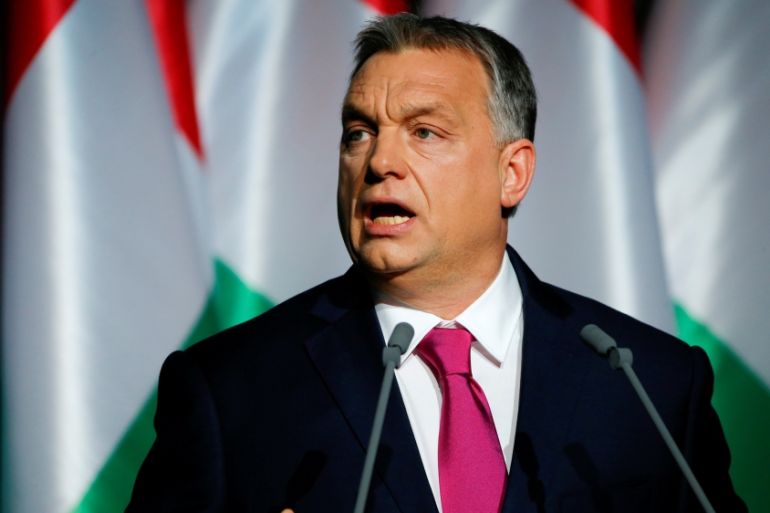We will not be intimidated by Hungary’s NGO law
The Hungarian government has launched an active campaign against NGOs but we will resist.

“Even though I’d braced myself for the news, yesterday’s result still sent a jolt through me like electricity,” Julia Ivan, director of Amnesty International Hungary told me today. “Hard won freedoms will be lost and the vital work done by NGOs to create a freer and fairer society will be seriously hampered by Orban’s bullying politics.” As director of an organisation that will itself be affected by the new NGO law was passed today, she should know.
|
|
Keep reading
list of 4 itemsIs the ICC going to issue arrest warrants for Israel and Hamas leaders?
Russian playwright and director go on trial over ‘justifying terrorism’
UK court to rule on Julian Assange extradition appeal: What could happen?
On the face of it, the Law on the transparency of organisations funded from abroad carried by the Hungarian parliament today with a comfortable government majority might look fairly benign. The title of the law suggests it is aimed at increasing transparency, while authorities claim it is important in the fight against money laundering and international terrorism.
But when examined more closely, this veneer of respectability quickly falls away. In effect, the law is a thinly disguised attempt to stigmatise non-governmental organisations that receive foreign funding and hamper their vital work.
A systematic campaign
The law will force NGOs receiving more than 24,000 euros ($27,000) a year to re-register as “civic organisation funded from abroad”. They will have to put this pejorative label on every publication they publish. The logic behind this is clearly that NGOs funded from abroad may serve foreign interests “endangering the sovereignty and national security of Hungary”, as the authorities have claimed.
While some MPs tried to maintain a straight face when talking about the proposal, most of them recognise that this is yet another attempt to silence critical voices. In January, Szilard Nemeth, one of the MPs who later submitted this proposal, said: “we must repress these NGOs with every means, and I think, they should be swept up”. In March, Prime Minister Viktor Orban stated that NGOs such as the ones that challenged Hungary’s inhuman border policies have “nothing to do with genuine civil society and are untenable”.
This vicious and calculated assault on civil society must be resisted on all levels - from grassroots organisations in Hungary to the European Union in Brussels.
In Hungary, an ongoing smear campaign has been targeting many civil society organisations that receive funding from foreign and international sources that the government cannot control. This culminated in the statement by the Prime Minister earlier this month that the George Soros’ network and its “agent organisations” operated in a “mafia-style”, and “can hardly be described as civil society organisations”.
Last February, Amnesty International was described by the governing Fidesz party as “one of those agent organisations” encouraging migrants to break the law and publishing fake reports. The government has been particularly incensed by Amnesty International’s ongoing campaign calling for justice for Ahmed H, a father of two, labelled a terrorist and sentenced to 10 years after using a megaphone to call for calm during clashes at the Hungarian border. Ahmed admitted to throwing three objects at the Hungarian police during the clashes, but this cannot credibly constitute an act of terrorism. The appeal against his sentence takes place on Thursday, June 15.
The government has further increased its control over the public broadcasting network. It has poured over 250m euros ($280m) last year into the public broadcasting service which has been operating as its mouthpiece since 2010. Investors with close ties to the government bought and shut down the largest opposition daily Nepszabadsag, and have acquired more than a dozen local newspapers and managed to align national TV channels with the government’s policies.
Resisting repression
Against this repressive tide, the space carved out by human rights defenders and civil society has remained one of the last bastions of independent activism and critical voices. They have achieved a great deal despite the risks and challenges they have faced for years. Earlier this year, for example, the Helsinki Committee – one of the most aggressively smeared NGOs – managed to prevent the detention of asylum seekers through advocating for immediate intervention by the European Court of Human Rights.
|
|
The real intentions behind this law are very clear. By creating its own version of the draconian Russian “foreign agents law”, the Hungarian authorities are trying brand foreign-funded NGOs as a fifth column. The vital work and wide range of activities carried out by civil society organisations – helping to promote the rule of law, protect the rights of refugees, migrants and other marginalised groups or provide social and legal services not offered by the state – will be affected.
And without the NGOs, many will be left without assistance and support. The people who will ultimately be affected by this law will not be just refugees as the authorities claim, but will also have a negative impact on children with autism and pregnant women. It will affect Roma and LGBTI people, people with disabilities, people living with HIV and people who use drugs, homeless people, survivors of domestic violence and many more.
This vicious and calculated assault on civil society must be resisted on all levels – from grassroots organisations in Hungary to the European Union in Brussels. And it is happening.
“It is hard to see silver linings on a day like today but I have never seen Hungarian civil society united like this before,” Julia Ivan tells me. “More than 250 NGOs have come together to form a joint campaign called Civilizacio2017. We will not give up.”
Todor Gardos is Amnesty International’s Hungary researcher.
The views expressed in this article are the author’s own and do not necessarily reflect Al Jazeera’s editorial policy.
